Scarsdale's Non-Partisan Party Scores Big Victory in Hotly Contested Election
- Details
- Written by Joanne Wallenstein
- Hits: 14807
Carl Finger, Dan Hochvert, Seth Ross and Matt Callaghan. Photo by Lisa Van Gundy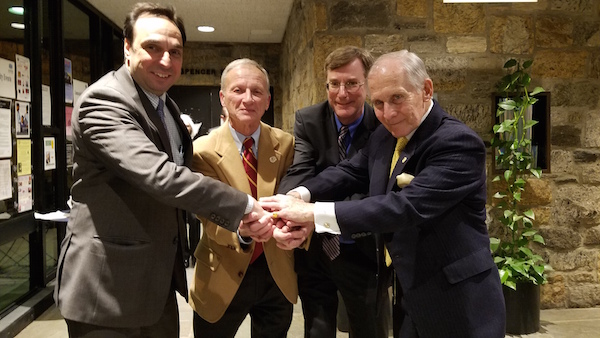
Photo Credit: Harvey Flisser
Running for the Scarsdale Non-Partisan Party were a slate of candidates with many years of volunteer service to the Village. Dan Hochvert, a former Village Trustee was elected Mayor, Carl Finger and Matt Callaghan were re-elected to serve second terms as Village Trustee and Seth Ross was elected as a new Trustee.
The opposition party was formed in the wake of a Photo Credit: Harvey Flisser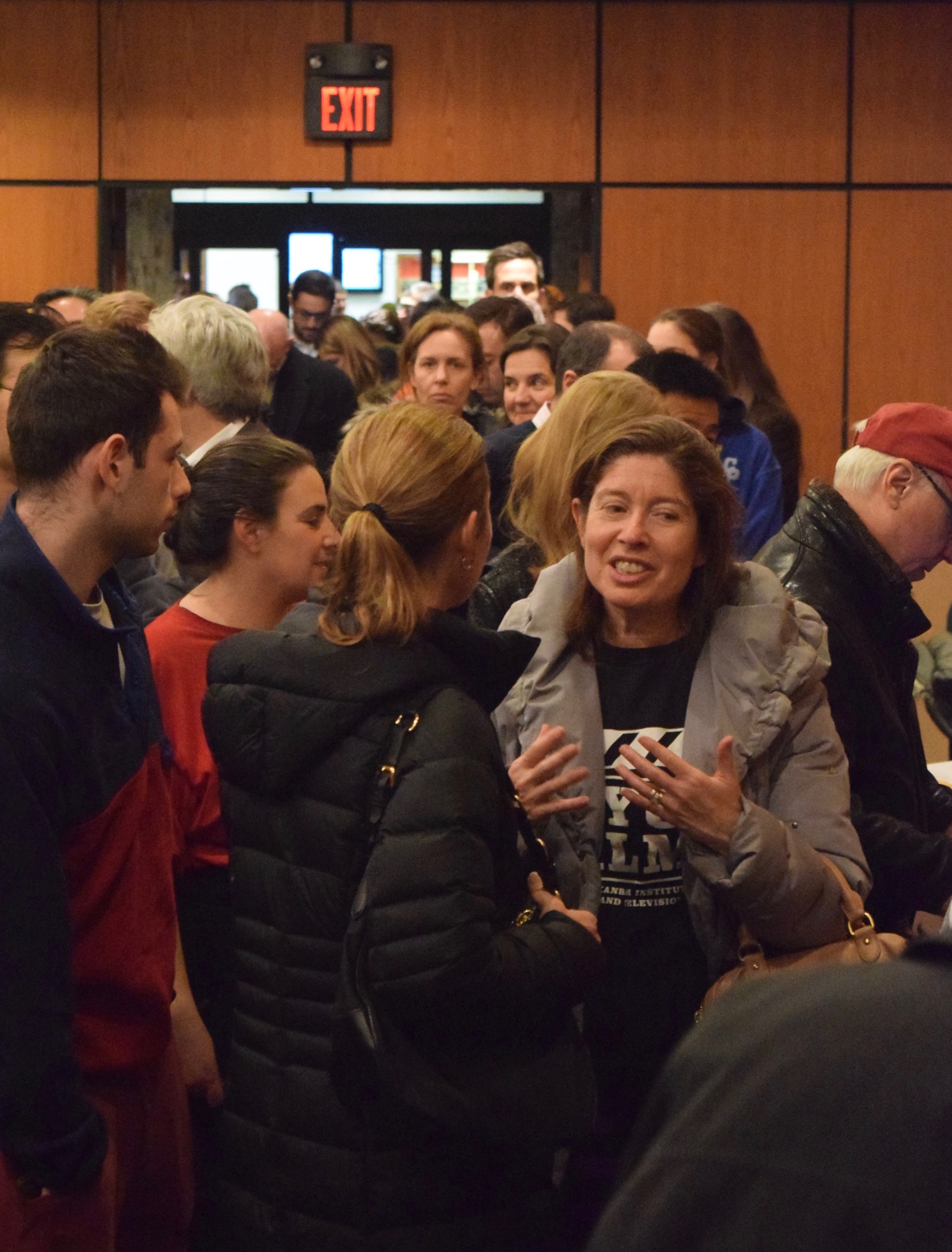
The campaigns for both parties were led by younger women who brought leadership, new tactics and a new generation into the fight . ML Perlman, the next President of the Scarsdale Forum served as campaign chair for the Non-Partisan Party, while Mayra Kirkendall-Rodriguez chaired the Scarsdale Voters' Choice Party.
During the course of the long day of voting, no one seemed at all sure which way the vote would go. As more and more voters surged to the polls, it was difficult to discern what the outcome would be.
However, at 11 pm, after the votes were counted, it appeared that the Scarsdale Voters' Choice Party's calls for increased transparency, lower taxes and new roads failed to draw enough voters to overturn the status quo.
Here are the vote counts: (including absentee ballots)
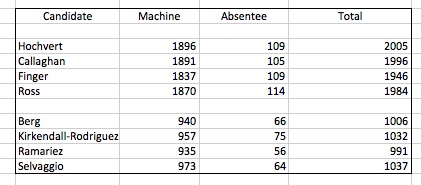
What motivated voters? Though there was no exit polling, here are a few reasons voters gave for their decisions. The Scarsdale Voters' Party attracted 1,000 voters, triple the number of voters in a regular election. They promised minimal tax increases and better roads. This was an appealing message to those who feel their taxes are too high. However, Berg had many opponents as well. Some remembered that he had objected to the construction of a fitness center at the high school and led a campaign to defeat a school budget. Fearing that he would pressure the schools to cut their budget, they came out to vote for his opponent. Residents at Christie Place objected to Berg's pleas to enact the Homestead Act which would have doubled real estate taxes on condominium owners. Others came out to support non-partisan politics and Scarsdale's non partisan system of governance.
The campaign was noisy and visible. The Village was covered in campaign signs, candidate for Mayor Robert Berg made robo calls to Scarsdale households, there were meetings, mailings and heavy use of social media. In a town where candidates for Village Board and School Board are usually selected by nominating committees, the change was notable. Some voters said they objected to the divisive nature of partisan politics and were inspired to vote to ensure that Scarsdale did not go the way of national politics.
Speaking at the Scarsdale Woman's Club after the results were announced, Dan Hochvert vowed to mend fences and get to work for the Village of Scarsdale. Matt Callaghan called the team "the stewards of the public good," and Seth Ross said, "though we don't always agree, we are all members of a community." Carl Finger promised to be "the best trustee I can be," and Mayor Jon Mark praised the widespread participation and called on residents to volunteer and work for the community they love.
The candidates from the Scarsdale Voters' Party did not attend the post-election celebration and missed the invitation from the Non-Partisan Party to mend fences and put partisan politics behind them.
Record Numbers of Voters Participate in Village Election
- Details
- Written by Joanne Wallenstein
- Hits: 10871

(Updated at 8 pm:) The Village election has brought out an unprecedented number of voters. As of 6 pm it was estimated that 1,700 votes had been cast. Campaigners were standing at the train station to encourage residents who were getting off the train to go to the polls.
The polls will close at 9 pm. When the count is complete, the results will be announced at the post-election celebration at the Scarsdale Woman's Club on Drake Road.
Though so many people voted, the wait to vote was not long. Village Clerk Donna Conkling was well prepared for big numbers at the polls. This year, there are six electronic scanners for ballots – and voters do not need to sign in by election district, something that has slowed the process in the past. Instead, the voter rolls are in alphabetical order to make it easy to find your name.
Voting is taking place in the Scott Room of Scarsdale Public Library.
Here are the names of the candidates for Mayor and Village Trustees you will find on the ballot. You can vote for one candidate for Mayor and three candidates for Village Trustee. You are not required to vote for all candidates in one party line; you can select those you want from Rows A and B.
Scarsdale Citizens' Non-Partisan Party: (Row A)
For Mayor: Dan Hochvert
For Village Trustee:
Matt Callaghan
Carl Finger
Seth Ross
Scarsdale Voters' Choice Party (Row B)
For Mayor: Robert Berg
For Village Trustee:
Carlos Ramirez
Brice Kirkendall-Rodriguez
Robert Selvaggio
The results of the election will be announced tonight – March 21, 2017, at the Scarsdale Woman's Club on Drake Road – after the polls close at 9 pm. The public is invited to this post-election celebration.
The Teen Center Makes Sounds Financial Sense for Scarsdale
- Details
- Written by Joanne Wallenstein
- Hits: 4128
 This is a statement to the Board of Education and the Village Board from Scarsdale Teen Center Board President B. Kathleen Munguia:
This is a statement to the Board of Education and the Village Board from Scarsdale Teen Center Board President B. Kathleen Munguia:
Because there was no opportunity for public comment following the joint meeting of the School and Village Boards on Monday, March 6, 2017, and another commitment prevented me from attending School Board's Budget Session #3, I would like to address some of the comments made by both Village and School Board members that did not fully inform the community of the history of the not-for-profit organization, The Scarsdale Teen Center (the Center), whose doors have been open since May 1999. The Center welcomes Scarsdale teens, whether they attend Scarsdale schools or not as well as nonresident students attending Scarsdale schools. And despite the re-imaging of the Center by the current School Board as being established for teens at risk or that there is a "stigma" associated with using the Center, the Center was established by a community that recognized the risk to all our children as they grow more independent and that sometimes, they stumble. That community supported a supervised, drug and alcohol free place for teens to socialize, run an event and enjoy programming tailored to their ever changing interests.
Public funding from the Scarsdale School District has been $65,000 annually for the last five years, $22,500 less than the original funding committed by the district in 1999 despite rising costs in the operation of the Center, creating more pressure on this small not-for-profit to seek other sources of income including rentals of the space and charging for programming other than drop-in hours to meet the shortfall. Still the Center persevered and reached out to state and county grants, private foundations and private donors, mindful of its budget and never going into debt. Characterizing the Center as operating in the red is misleading and while the need for adequate public funding continues, the Center has shown that its creative Board and staff has met the shortfall between the public funding and the costs of operation and deserves to be supported by its community tax base to fulfill its mission.
The Village Board has continued to support the Center at $87,500 annually and realized that using the facility for its recreational needs for families with children of all ages made sound financial sense. Scarsdale's School District never understood that and made the "nonuse" and "disconnect with the School District" arguments a self-fulfilling prophecy by simply not using it or entertaining efforts to collaborate with the Center. The yearly dismissive response by the Administration seemed to infect the attitudes of the PTAs and PT Council despite the fact that it was some of its former leaders who helped establish the Center in the first place. It took years to gain some traction within the PTA organizations and recent collaborations have been encouraging as the goal of supporting the "whole" child no longer means only within the confines of a five day a week school classroom or ignoring parental concerns.
While they are many reasons for the lack of use during drop in hours which the Center curtailed in the wake of less public funding, less teen use on Monday through Thursday of the school year and in response to a different model for serving the community's teen population and families, the School Board only focused on drop-in usage and ignored the 2,220 visits to the Center and Center events held in larger community spaces from January through December 2016.
It is likely that both the School and Village Boards will not commit public funding to the Center for next year. They have asked for the Center to propose another model for operating at less cost, to them. The Center has had this discussion over the years with both Boards. The Center looked at other commercial spaces as well as School and Village spaces. None was as financially sound as staying put in the rental space the community remodeled and improved over the years, including an outside deck built by its volunteers. If either the School District or the Village has space to offer the Center, neither Board is raising their hand. In a community that has always had community space issues and may for some time be facing more with a library renovation and Greenacres School project on the horizon, does it make sense to walk away from a completed community space that the Village, the School and yes, even the library could use over the next few years should the Center have adequate public funding? One use that comes to mind is a Mandarin Project which can begin as early as this spring as an afterschool or weekend program at the Center and continue into the summer months before, during or after the Village recreational camps.
The Center will continue to operate through its fiscal year. There are several community programs in the works, the development of the OneLove Project empowering young people to understand and recognize abusive dating relationships and equipping them with the skills to help themselves and their friends. As the Center did for the showing of the documentary, "Screenagers" this past November, the Center is collaborating with the Scarsdale Edgemont Family Counseling Service and the SHS PTA and will conduct training workshops at the Center. The Center is sponsoring several soap box derby building projects at Fox Meadow School and with the Scarsdale Boy Scouts and can provide a number of already built cars that can be refurbished and raced in the annual Soapbox Derby held in New Rochelle in June. The Center is currently looking for new Board members to discuss the future of the Center, with or without public funding. Interested members of the community should visit www.thecenter862.com for more information or contact the Bonnie Yaseen, Chair of the Nominating Committee, bonnie@yaseen.com.
Respectfully submitted,
B. Kathleen Munguia
President of the Board
Scarsdale Teen Center
The Center @ 862
Your Letters on the Election
- Details
- Written by Joanne Wallenstein
- Hits: 5295
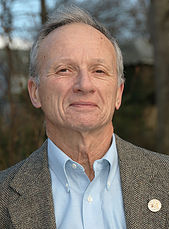 We have received many letters in support of candidates running in the Village election on Tuesday. Here are two letters in support of candidates for Mayor:
We have received many letters in support of candidates running in the Village election on Tuesday. Here are two letters in support of candidates for Mayor:
(Letter from Suzanne Seiden in Support of the Non Partisan Slate
To the Editor,
I love Scarsdale and have actively participated in the community for more than 15 years.
I live in the Mamaroneck strip and, although my children have attended the Scarsdale schools, I cannot vote in the Village election on March 21st. I feel strongly, however, about the election and urge you to vote for Dan Hochvert for Mayor and Row A for trustees.
In my years of volunteering in the Scarsdale community in such roles as School Board member (six years) and School Board President, PTA President for Quaker Ridge Elementary School, PTA President of Scarsdale Middle School, Co-Chair of the Quaker Ridge Bond Campaign, Co-Vice Chair of the Drug and Alcohol Taskforce, Co-Chair of the Young Writers' Conference, I have had the opportunity to work with hundreds of Scarsdale residents -- volunteers dedicated to making the schools and community better for all of us.
Dan Hochvert is one such individual. In fact, he has been actively engaged in Scarsdale for many years – working tirelessly and productively with other members of the community to make positive change for all.
In direct contrast is Bob Berg, who I believe should not be elected. The role of Mayor requires an individual who advocates on behalf of all Scarsdale's citizens from its children to seniors.
Mr. Berg twice stood before the Board of Education (in the spring of 2016 and again in the fall of 2016) and requested that the School Board sue the Village over the Ryan Revaluation. Mr. Berg claimed that if the Board chose not to become involved in the case, he could mobilize voters to come out against the school budget (which he did several years earlier). In addition, Mr. Berg chose to sue the School District regarding the passage of the budget, trying to force outcomes he wanted and putting students' education in jeopardy. He did not prevail, but forced the District to spend precious school dollars to defend this baseless case.
Do we want a Mayor who has previously sued the School District and threatens the School Board when he does not get his way? As Mayor, would he threaten the School Board over Village matters? Would he try to bully the School Board over policy?
I have personally seen Mr. Berg insult the Superintendent, School Board members and community volunteers.
This is not want what I want for my community. I urge you to vote for Dan Hochvert for Mayor and Row A trustees. They will work with community members and on behalf of the entire community. Every vote matters and the future of our community and schools depend on it.
Suzanne Seiden
22 Fairway Drive
Mamaroneck, NY 10543
Letter from Darlene LeFrancois Haber in Support of Dan Hochvert
To the Editor:
I am writing as a private citizen in strong support of Dan Hochvert, the Scarsdale Citizens' Non-Partisan Party Slate candidate for Mayor. While Dan certainly has a long impressive resume of formal civic service on our Village Boards and Councils, as is often the case, resumes only tell half the story!
I know Dan best through my recently gained position on the Board of the Scarsdale Forum, but that is not where I first met him. I was befittingly first introduced to Dan about five years ago on a sunny afternoon by my then young teenage daughter (Naomi Haber), a devoted gardener, at the Scarsdale High School garden. During my daughter's high school tenure, Dan engaged in several garden related initiatives, including the building of the gardening shed. To have recently learned that he built the outdoor deck on the Scarsdale Teen Center with the help of other volunteers of course came as no surprise to me. As prior high school student liaison on the Friends of Scarsdale Parks (FOSP), Naomi worked with Dan in his Board member and Treasurer positions. I learned of not only his incredible kindness and mentoring of her, but also of his unending dedication and the countless hours he devoted to the conservation and beautification of our Village, in Harwood Park and other locations. The time and care that Dan has spent volunteering his energy and expertise on this and numerous other service throughout our Village is unparalleled, and speaks to his priorities, character, and diligence.
Similarly, I heard high praise from my husband Warren Haber in his prior interaction with Dan on the Citizen's Nominating Committee. My husband describes Dan as "a natural leader with exemplary facilitation and negotiation skills." In my position on the Scarsdale Forum, I have truly been privileged to work alongside Dan and witness the same. In addition, there are many laudatory examples of the tremendous foresight, care, and commitment that he routinely applies to Village issues. As the Co-chair of the Forum's Education Committee, he took an instrumental role working with others in a proposal for "a new paradigm of resilient community problem-solving and development of a long-range financial plan in support of Scarsdale schools." Dan is forward thinking, has a vision for the future of our community, and is confident we can, as a community, come together for physical, social, and economic resilience. I passionately agree with him.
As another example of Dan's community advocacy, in the recently proposed construction of a Hyatt Field Park parking lot, Dan recruited other Village leaders and personally surveyed the property with officials to see the impact of the proposal. In Dan's world, a personal survey of all matters is his routine. Dan doesn't just talk the talk, he also walks the walk. He is never afraid to take on a challenge. In fact, his thorough hands-on approach is his mantra; Dan is a doer. As a physician-educator I preach and live the importance of being hands-on because I have learned things may not always be what they initially appear. Dan believes in a thorough, thoughtful, balanced, and experiential, first-hand assessment of issues, cognizant of the importance of getting it right.
There is no better candidate to entrust to the position of Scarsdale Village Mayor. His extensive experience makes him exceptionally well qualified for this role, but it is his vision, leadership, and character that have earned him my respect and trust.
Darlene LeFrancois Haber
Scarsdale Village Working to Improve Communications
- Details
- Written by Joanne Wallenstein
- Hits: 5919
Ad Hoc Committee Members from left to right: ML Perlman, Trustee Deborah Pekarek, Deputy Village Manager Robert Cole, Scott Rompala, Andrew Sereysky, Laura Halligan, Lee Fischman, Trustee Jane Veron Not pictured: Justin Arest, Dara Gruenberg, Justin Hamill, Barry Meiselman, Carol Silverman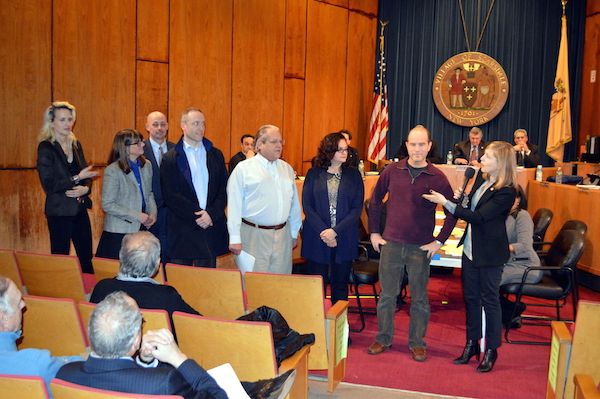
The revamped site is also the first step in Scarsdale's initiative to improve communications and build a better dialogue with the public. Championing this effort is the Ad Hoc Committee on Communications, led by Trustee Jane Veron, which is charged with identifying opportunities to enhance village interaction with residents. Members were selected for their experience and expertise in pertinent subjects such as public relations, information technology and neighborhood outreach, and for their collective diversity. They include Justin Arest, Lee Fischman, Dara Gruenberg, Laura Halligan, Justin Hamill, ML Perlman, Barry Meiselman, Scott Rompala, Andrew Sereysky, Carol Silverman, and liaisons, Village Trustee Deborah Pekarek and Deputy Village Manager, Robert Cole.
Formed in October 2016, the committee quickly completed its first mandate – reviewing, refining and introducing the revised website. The previous site, developed years ago, lacked functionality and wasn't responsive to the myriad of mobile devices used today. According to Cole, "The site's organization, appearance, significantly improved functionality, new engagement tools, and richer, more advanced email/SMS functions all are major improvements over the old version."
The updated design allows residents to not only locate and access information more easily, but permits them to customize their website experience by choosing to receive specific information through text or email. It also encourages users to submit and track service requests online, and features a dramatically improved search function.
|
Residents Asked to Subscribe for Village Emails Recreation Users: You Must Take Action to continue receiving notices and flyers Due to the launch of the new scarsdale.com, Scarsdale Village will discard old email notification lists that have been in use over the past few years. Unfortunately, technical limitations preclude migrating subscribers to the new site's notification system. As a result, all residents who currently are receiving village email alerts must re-subscribe via the new website to continue this service. This includes all official government notices and, of particular interest, news from the Scarsdale Parks, Recreation and Conservation Department. To avoid disruption in communications, the public is asked to re-subscribe by March 10, 2017. |
To introduce the site's new features and assist users in navigation, the communications committee, Scarsdale Cable Commission and SPTV developed an online tutorial video, Welcome to Our Website. "The video epitomizes the collaborative spirit and determination that propels the committee's efforts. In no time, the group pulled together and produced a tutorial targeted to novice website users," Veron said.
In the first months after launch, the new scarsdale.com has generated a good amount of compliments and user feedback. "We'd like to receive additional input from the community to help us make the website a truly useful resource," says Cole. "Both village staff and the communications committee review all comments and implement immediate changes where possible."
By serving as a primary focus group for evaluating the site's features and organization, the committee will help iron out the kinks that always arise when introducing new technology. It also will continue its work to introduce scarsdale.com to the community and evaluate feedback.
Residents are invited to visit the site, and provide suggestions and questions to communications@scarsdale.com. Most important, all are encouraged to sign-up to receive personalized alerts and information from village government.
In addition to monitoring the website rollout, the committee has moved on to the next phase of its work – developing a formal plan to improve current communications practices and increase public awareness. This includes assessing the types of information residents want and need, when and how it should be delivered, and related costs. As part of the process, the group is working closely with village staff and relying on input from the public.

Reports Veron, "Our combined efforts on the website redesign, in particular, present an important opportunity to engage our residents as we chart the future course of communications within Scarsdale. We are delighted to have resident volunteers with extraordinary talent and experience collaborating with the board of trustees and village staff."














